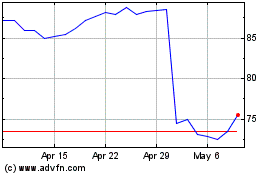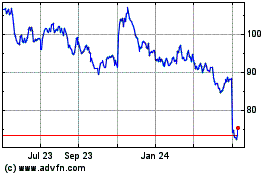By Valentina Pop and Sam Schechner
Alphabet Inc.'s Google and Starbucks Corp. scored legal
victories against European Union regulators Tuesday, in court
rulings that restrict the reach of the bloc's privacy orders and
deal a blow to its competition czar as she prepares to expand her
regulatory powers.
The European Court of Justice ruled that Google doesn't
generally have to apply the EU's " right to be forgotten" to
versions of its search engine accessed outside the bloc's borders,
though judges left the door open for European regulators to order
it to do so in specific cases.
Established in 2014 by another court decision, the right allows
a person to request that search engines remove links including
personal information from the results of web searches for his or
her own name.
The decision from the EU's top court is a victory for Google and
the companies and free-speech advocates that supported it, because
it avoids the creation of a general obligation. For four years,
Google has been fighting an order from France's privacy regulator
to apply the EU principle globally.
Over that period, Google and its backers have argued that
expanding the right to be forgotten would infringe on other
nations' sovereignty and encourage dictators and tyrants to assert
control over content published beyond their countries' borders.
"It's good to see that the Court agreed with our arguments,"
said Peter Fleischer, Google's senior privacy counsel, adding that
the company has sought to "strike a sensible balance between
people's rights of access to information and privacy."
Also on Tuesday, Starbucks won an appeal against an order handed
down in 2015 by EU Competition Commissioner Margrethe Vestager that
had required the coffee giant to pay Dutch authorities EUR25.7
million ($28.27 million) in allegedly unpaid taxes.
Starbucks welcomed the decision by the EU's second-highest court
and said it "pays all of its taxes wherever they are due."
In a separate ruling, the same court annulled a EUR33.6 million
fine given to British multinational bank HSBC Holdings PLC,
although it backed Ms. Vestager's allegation that the bank was part
of a cartel rigging the Euribor rate. An HSBC spokesperson said the
ruling relates to alleged misconduct during the course of one month
in 2007. "We have consistently disputed that our actions
constituted anticompetitive behavior and are considering all
aspects of the ruling and our legal options," the spokesperson
said.
Both the decisions can be appealed at the European Court of
Justice. They come two weeks before Ms. Vestager -- dubbed Europe's
"tax lady" by President Trump -- assumes a more influential
regulatory role over tech companies atop her competition
powers.
Ms. Vestager said in a statement Tuesday that she would continue
to go after sweetheart tax deals and investigate whether they
result in illegal state aid.
But she also suggested that competition policy faces
limitations. "The ultimate goal that all companies pay their fair
share of tax can only be achieved by a combination of efforts to
make legislative changes, enforce state aid rules and a change in
corporate philosophies," she said.
The General Court on Tuesday did uphold a tax decision that Ms.
Vestager issued in 2015 that led to Luxembourg recovering EUR23.1
million from Fiat Chrysler Automobiles NV.
The Starbucks and Fiat Chrysler cases were the first two big
decisions Ms. Vestager took against multinational companies after
the Washington-based International Consortium of Investigative
Journalists reported in 2014 on Luxembourg's tax dealings with big
corporations. Ms. Vestager broadened the scope of her tax query
beyond Luxembourg, requesting information from all 28 EU
governments on their respective tax arrangements.
Those probes yielded a record decision against Apple Inc. in
2016, when Ms. Vestager ordered Ireland to recover $14.5 billion in
allegedly unpaid taxes from the U.S. tech giant. Apple has appealed
that ruling and last week its lawyers brought their arguments
dismissing the Competition Commission's case before the same judges
who ruled in the Starbucks case.
Amazon.com Inc. has also appealed against Ms. Vestager's 2017
order that it repay Luxembourg nearly $300 million in allegedly
unpaid taxes. Other probes by her office, including against
Anheuser-Busch InBev SA, Pfizer Inc. and Nike Inc., are
ongoing.
Legal experts say Tuesday's rulings fit with recently increasing
toughness from EU courts toward the commission. "They're really
raising the standard of evidence that they require from the
commission," said Leigh Hancher, a senior adviser on competition
law with U.S. legal firm Baker Botts. "We're moving away from very
formalistic cases. Now the court is saying, 'it's not enough --
show us that someone got an economic advantage'."
Ms. Vestager will face questions on taxation policy and the
court rulings during hearings in the European Parliament on Oct. 8,
before she can take office in her newly expanded role, EU lawmakers
said.
"The verdict in the Starbucks case is a step back and
competition commissioner Margrethe Vestager has to carry the can
for that," said Markus Ferber, a German center-right lawmaker who
will grill her during the hearings.
Other lawmakers said the court decisions justify giving the EU
more powers over tax policy. "Today's rulings by the General Court
show that we need much better EU-wide rules to end tax avoidance by
multinationals, " said Sven Giegold, a German lawmaker.
Ms. Vestager's incoming boss, European Commission
President-elect Ursula von der Leyen has pledged to "tax profits
where they are generated" and overhaul the corporate tax systems
across the bloc, arguing that they "do not capture the new business
models in the digital world." A similar idea is under discussion in
the Organisation for Economic Cooperation and Development, in which
the commission participates. Ms. Vestager's new portfolio will
include taxation and other regulation of tech companies.
Write to Valentina Pop at valentina.pop@wsj.com and Sam
Schechner at sam.schechner@wsj.com
(END) Dow Jones Newswires
September 24, 2019 10:54 ET (14:54 GMT)
Copyright (c) 2019 Dow Jones & Company, Inc.
Starbucks (NASDAQ:SBUX)
Historical Stock Chart
From Mar 2024 to Apr 2024

Starbucks (NASDAQ:SBUX)
Historical Stock Chart
From Apr 2023 to Apr 2024
